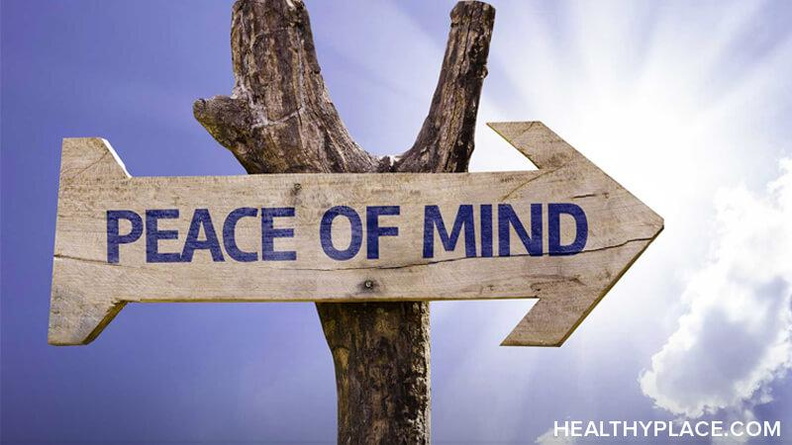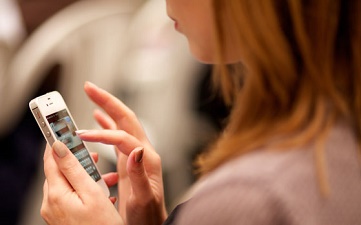5 Mental Health Recovery Apps You Should Try

It is the age of the smartphone, and there is a mobile app for everything--including mental health recovery apps. You can find applications designed to help with everything from depression and anxiety to posttraumatic stress disorder (PTSD), addiction recovery, eating disorders and self-esteem. Some offer interaction with others in recovery, some provide feedback and advice based on the information each individual records, and some simply give users techniques for reducing anxiety and encouraging gratitude and optimism. No app is meant to take the place of face-to-face treatment, but I have found these mental health recovery apps you should try can be a useful addition to my mental health recovery.
My smartphone is never far out of reach and I know that I am not alone. It's estimated that over 207 million people in the U.S. own a smartphone, and the number continues to rise. That, coupled with the fact that I think whatever support you can find for mental health recovery is useful, led me to try out mobile apps for my own recovery. I have long since used mobile apps for my alcoholism recovery (12 Steps Companion, Sober Grid, and In The Rooms are my favorites), but I hadn't tried any that were designed for other mental health issues. So I thought I would give some a try and let you know which ones I find helpful.
Mental Health Recovery Apps to Try

For the last month or so, I have been testing about a dozen different mental health apps, and I have picked my favorites to share. These are the five mental health recovery apps that I will continue to use:
Reachout -- This app is the first of its kind. It is a social support app for people with various conditions including: health issues like cancer, diabetes, and heart disease, as well as mental illness and substance abuse issues. Users can share their stories, read others' stories and interact with one another. I like this app because it applies to so many different illnesses, all in one place. It was easy to get involved in conversations, offer and obtain advice and feel a sense of community.
PTSD Coach -- Developed by the Department of Veterans Affairs' National Center for PTSD, this app allows you to track your PTSD symptoms over time and offers tools for management. I like this app because it allows you to store your symptom information so that it can be shared with your doctor easily. It also allows you to create a support network, storing the contact information for quick access if there is ever an emergency.
Optimism -- This app relies on self-tracking as a tool for dealing with mental illnesses like depression, anxiety, bipolar disorder, and PTSD. You are able to detect patterns in mood, identify triggers, and create an individualized wellness plan to help you manage your mental health. I like this app because it allows me to see what is going on with my mood at a glance.
SAM Self-Help for Anxiety Management -- With this application, users are able to record their anxiety levels and identify triggers. It includes over 20 self-help options for people to use to deal with the physical, emotional, and mental symptoms of anxiety. It allows users to assemble a customized "toolbox" of the app's features that work best for them. You can also use the social cloud feature to share your story with other members. I like this app because it offers different coping tools and it can be easily customized for each individual.
Secret of Happiness -- This app focuses on gratitude as a method to relieve depression and anxiety. You don't have to spend a lot of time using this app to reap the benefits. The app alerts you every morning and evening (at times you can set) to reflect and record the things in the last 24 hours that you are grateful for (evening), and your goal for the day ahead (morning). I like this app because it is simple yet effective.
Finding the Right App for Your Mental Health Recovery
The above are just a few of the apps I tried and really liked. There are many others to choose from that range in their cost (many are free), format, and the mental health issues they support. You can find everything from relaxation apps that use breathing techniques or meditation, to apps to help with eating disorders.
The only way to figure out what will work best for you to just try a few and see what you like. If you are currently using mental health recovery apps, I would love to hear your experiences and recommendations.
Find Jami on Facebook, on Twitter, on Google+, and on her blog, Sober Grace.
APA Reference
DeLoe, J.
(2016, August 4). 5 Mental Health Recovery Apps You Should Try, HealthyPlace. Retrieved
on 2026, January 7 from https://www.healthyplace.com/blogs/traumaptsdblog/2016/08/5-mental-health-recovery-apps-you-should-try
Author: Jami DeLoe
After working on this off and on for 5 years, I finally just released an Android application called ‘Mood Triggers’, which helps people to identify the triggers of their anxiety and depressed moods. It’s a completely free application with no ads (purely a labor of love).
Here’s a brief YouTube video explaining the app:
https://www.youtube.com/watch?v=Lx-hqXYDEGE
Here’s the link to the Mood Triggers App in the Google Play Store:
https://play.google.com/store/apps/details?id=com.nick.moodtriggers.anxietyanddepressiona…
Since I didn't belong to digital generation, the first of all, I didn't possess any sophisticated skill to use and to exploit digital technology on daily basis, and to maintain my mental health statement, as well. However, the benefits of telecommunication technology are welcomed, because the permit professional information, discrete help and great support to different mental disorders. This assistance indicates additional contribute to comprehensive psychiatric treatment and management of mental illnesses. But the irrepressible tendency of new generation to overuse smartphone performances exhibit serious damage to mental health, as side and undesirable effect. It ought to know that direct contact with psychiatrist is the best way to treat and solve any mental difficulties. This kind of interpersonal relation embraces personal, emotional and social dimensions that are crucial elements of mental comfort and stability. so it is advisable to use recovery apps as second choice on current psychiatric treatment of any mental problem, behind clinical psychiatric observation and face to face communication. Otherwise, the greediness inclination to mobile providers will lead to irreversible damage of our emotional condition as ground element of global welfare.
